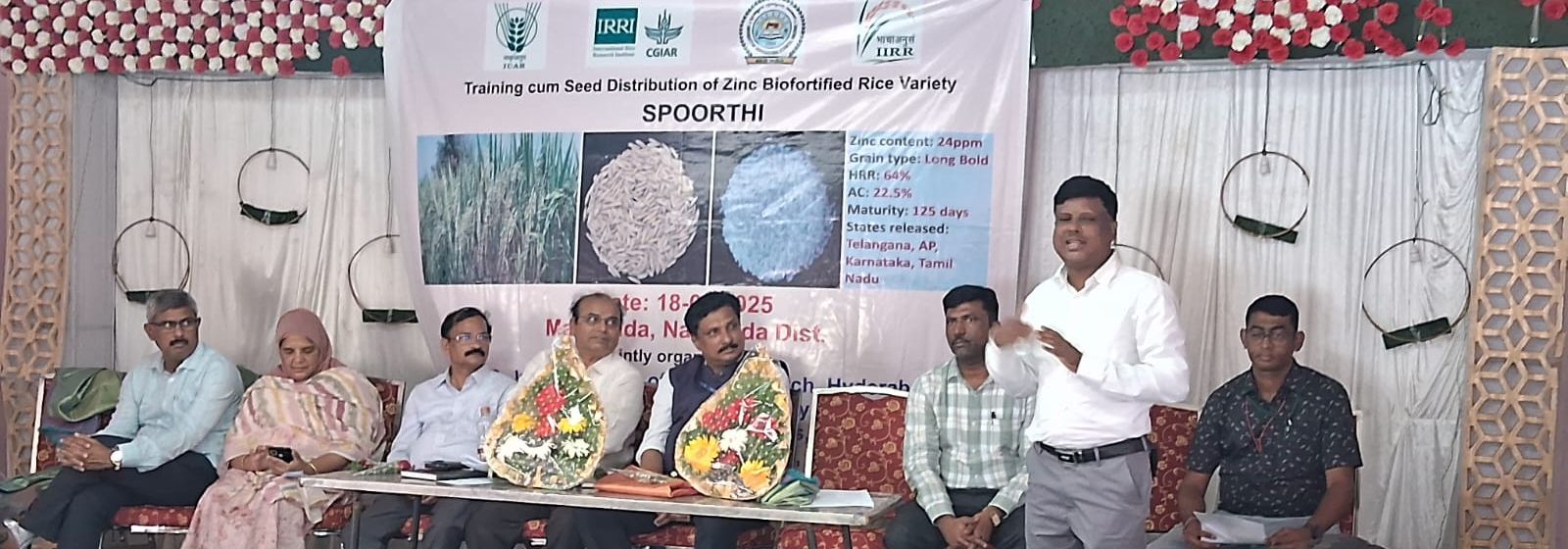Telangana, India (18 June 2025) – To help combat zinc deficiency and improve nutrition through staple foods, a new high-zinc rice variety, Spoorthi (GNV 1906), is being distributed to farmers in India following its official release for commercial cultivation.
IRRI, ICAR–Indian Institute of Rice Research (IIRR), and University of Agricultural Sciences, Raichur, conducted a training/seed distribution program in Raichur, Karnataka, and Marrigudem village, Nalgonda District, Telangana. Held at the University of Agricultural Sciences and in a local farming village, the events marked the beginning of Spoorthi’s deployment, with 50 quintals of seed provided to selected farmers for multiplication and scale-up.
Spoorthi was officially released in 2023 through a collaborative effort involving IRRI, IIRR, the University of Agricultural Sciences, Raichur, as well as partners from IRRI’s zinc biofortification breeding network in India. It was approved for commercial cultivation by the All India Coordinated Rice Improvement Program (AICRIP) and is the only zinc-biofortified rice variety to pass AICRIP testing in the last three years.
Zinc deficiency affects 30 to 40 percent of India’s population, especially women, children, and the elderly. Spoorthi was developed to help address this challenge by enriching a widely consumed staple with higher nutritional value. Spoorthi contains 26ppm of zinc in polished grain, which is significantly higher than presently grown rice varieties (which contain around 12-16ppm).
Moreover, it delivers yields comparable to popular varieties like IR64 and MTU1010, which typically yield 4.5 to 6.5 tons per hectare. This makes Spoorthi a practical and promising alternative that improves nutrition without compromising farm productivity.
While many rice varieties are approved annually, few reach widespread cultivation without timely seed multiplication and farmer awareness. For Spoorthi, early seed production is being carried out near seed production hubs established in Hyderabad, Telangana, and Raichur, Karnataka to enable faster scaling and farmer access.
The rollout also includes training and awareness programs to educate farmers on the health and economic benefits of cultivating biofortified rice. Traditionally, farmers have prioritized yield and pest resistance when choosing varieties. Partners hope Spoorthi will shift perceptions by showing how nutrition can also add value.
“Many farmers still associate value with yield or pest resistance, not nutrition,” said Dr. B.P. Mallikarjuna Swamy, IRRI Senior Scientist. “That’s why we’re working to create more awareness about the health benefits of zinc.”
Looking ahead, the focus will be on expanding seed supply and integrating Spoorthi into nutrition-sensitive programs. This includes partnerships with government departments and agencies supporting school meals and public health initiatives.
“We’re also exploring collaborations with the Department of Women and Child Welfare, school meal programs, and public-private partnerships to add value and expand reach,” said Dr. Swamy.


